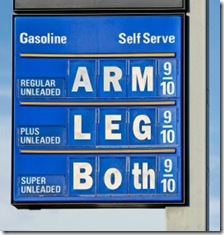Accounting for Gas
Topic: Bills and Expense Tracking,Managing Your Business | Comments Off on Accounting for Gas
 Ron White from the LA Times reported on Monday, May 3, “Nationally, the average for a gallon of regular gasoline climbed 1.5 cents overnight to $3.97 on Tuesday, according to AAA, and analysts widely expect the U.S. average to hit $4 a gallon within the week for the first time since the summer of 2008. In California, the average reached $4.27 a gallon Tuesday, second only to Hawaii at $4.57.” And there is speculation that the gas rate will continue to rise and we could see close to $5.00 per gallon at the pump in some states this Summer.
Ron White from the LA Times reported on Monday, May 3, “Nationally, the average for a gallon of regular gasoline climbed 1.5 cents overnight to $3.97 on Tuesday, according to AAA, and analysts widely expect the U.S. average to hit $4 a gallon within the week for the first time since the summer of 2008. In California, the average reached $4.27 a gallon Tuesday, second only to Hawaii at $4.57.” And there is speculation that the gas rate will continue to rise and we could see close to $5.00 per gallon at the pump in some states this Summer.
If you are small business owner and use your car for business purposes, you can recoup some of the costs by tracking the miles you are driving for business-related travel.
How to track mileage
Generally, to start tracking mileage on a vehicle, you need to record your vehicle’s odometer reading and the date you put your vehicle into service for your business. I keep a small notebook in the car glove box to write down the beginning odometer reading (how many miles are on the car when I started using it for business). Then each time I drive my car for my business, I record the date and the number of miles I drove, using the trip meter on my car. The trip meter is a setting on the odometer I can set to zero at anytime. I set it to zero when I get in the car to run a business errand and then when I get back home I read it again to see how many miles I drove for that trip. Alternatively, you can record your beginning odometer reading and your ending odometer reading and do simple math to see how many miles you drove if your car doesn’t have a trip meter.
At the end of the year, you can add up all the miles you drove the car for business purposes that you recorded in your notebook and multiply it by the standard deduction rate per mile and come up with the amount you can deduct on your Schedule C income tax report.
Standard Deductions
According to the IRS, beginning on Jan. 1, 2011, the standard mileage rates for the use of a car (also vans, pickups or panel trucks) will be:
- 51 cents per mile for business miles driven
- 19 cents per mile driven for medical or moving purposes
- 14 cents per mile driven in service of charitable organizations
Be sure to check the rules to see if you qualify to use the standard deduction mileage rates and as always check with your accountant for any other rules for your state or other practices that may benefit your unique business.
Actual Expenses
If you prefer to deduct actual expenses for your vehicles instead of the standard deduction, check out what expenses the IRS allows by reading Publication 463.
No matter which method for deducting the expenses you use, WorkingPoint can help you track employee reimbursements for gas and travel-related expenses and actual costs you incur for your vehicles. Use the Record Expense form on the home page Dashboard or from the bank accounts, choose Record Transaction > Payment or Purchase form and record what you spent on gas and car-related expenses. Choose an expense account that you use to track the expense, like the Car and Truck expenses account WorkingPoint sets up for you. This account is already linked up to our Schedule C Report, so filing your taxes is a breeze.